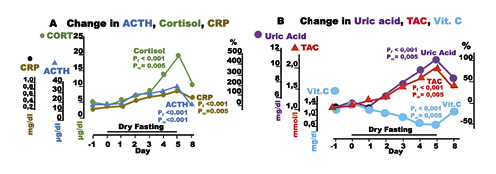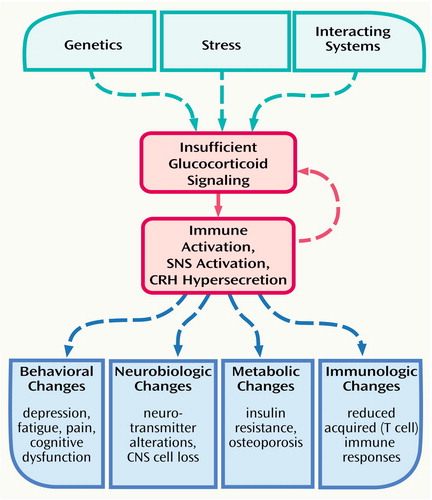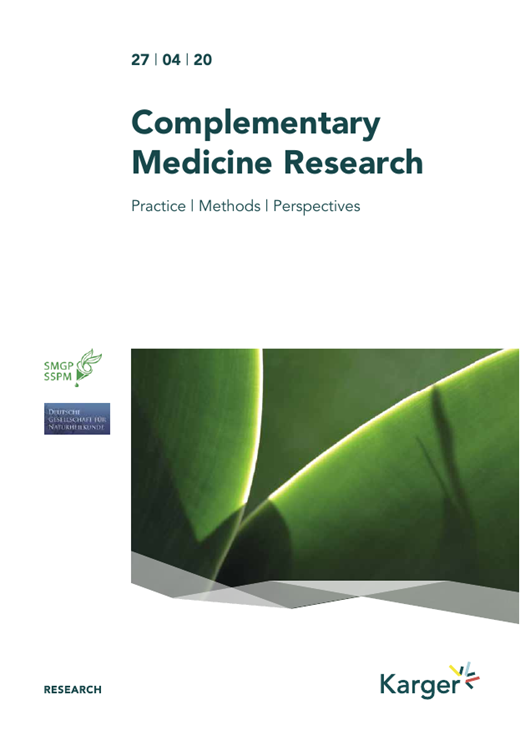Extended fasting, which typically involves going without food for periods longer than 24 hours, can have a significant impact on the body's hormonal balance, including the production and regulation of cortisol. Dry fasting is the most powerful and efficient fasting tool. But learn to use it properly.
In this discussion, I'm going to tackle some key topics about dry fasting and cortisol. Things like how much cortisol increases on a dry fast, the best strategies to deal with cortisol during and after a dry fast, why you might have gotten fat after a fast, how to avoid it, and how to handle fatigue and adrenal stress possible complications. Strap yourselves in!
Cortisol, known as the "stress hormone," is produced by the adrenal glands. Its primary role is in managing how the body uses carbohydrates, fats, and proteins, and it also helps regulate the body's response to stress. During extended fasting, cortisol levels can rise. This is because the body perceives prolonged fasting as a stressor. In response, the adrenals produce more cortisol to help maintain glucose levels and manage the stress.
Don't be an idiot and dry fast safely. you've already overburdened your body with stress, bad diets, and bad lifestyle for many many years. The answer to full health is in front of you. But it's kind of littered with obstacles. Hopefully, my articles help clear some away, kind of like a machete swinging through the jungle!
How much does cortisol increase during a dry fast?

Cortisol during a dry fast spikes just past day 3. This means that the following information about cortisol can be manipulated to your advantage. Want to minimize possible cortisol-related stress on your adrenals? Dry fast for 3 days max. I'm not against longer fasts. Sometimes they are necessary. But I hope you start to realize that sometimes less is more. Dry fasting for 7+ days multiple times in a too-short window? You're asking for those cortisol-related complications. Keep it to 5 days once a month until you're ready to spend a month or two preparing for a longer one.
How does the increase in cortisol during a dry fast interact with the process of autophagy?
Using the 5-day dry fast charts we can see that cortisol, CRP, and ACTH rise on day 2 and continue till day 3. After Day 3 cortisol shoots upwards. This doesn't correlate strongly to autophagy levels in the brain that were measured in a study called The 'selfish brain' is regulated by aquaporins and autophagy under nutrient deprivation. It might indicate that cortisol and autophagy are not directly linked.

In this study, we see that autophagy starts on day 1 and starts to taper down on days 2 and 3 as the body seems to start to adapt to the dehydration stress. It's almost as if our body has an autophagic limit, at least in the brain. This would indicate that something like 36-hour dry fasts might be extremely beneficial and ideal in the cases of brain-focused illnesses. We also get to avoid the insane cortisol spike. We don't have the studies on other parts of the body, but we also don't have studies that focus on hypertonic stress. Perhaps there are other mechanisms at play other than LC3 proteins?


Fasting and Adrenal Stress or Adrenal Fatigue
Adrenal Stress: Chronic elevation of cortisol due to prolonged fasting can strain the adrenal glands. Over time, this may lead to a condition often referred to as "adrenal fatigue," though this term is not widely recognized in conventional medicine. The main concern is that the adrenals may become less efficient at producing cortisol and other hormones, leading to imbalances.
Adaptation and Resilience
Some individuals may adapt to the stress of extended fasting better than others. The concept of hormesis suggests that low-level stressors like fasting can make the body more resilient over time. However, this does not negate the potential risks associated with prolonged elevated cortisol levels. Also, does this hormesis adaptation actually lower the benefits of a fast? This is something to take into consideration. I think so.

Cortisol is needed during a fast. But if we enter something called overly high chronic cortisol, the HPA axis might get burned out and you start to feel fatigued. This can lead to increased sympathetic nervous states with LOWER cortisol release. We don't want that. We want a good cortisol level. It's not bad, we just don't want too much or too little. It turns out burning them out, creates a situation of lower cortisol which means you burn energy less efficiently, which then has downstream effects like depression, fatigue, brain fog, insulin resistance, osteoporosis, and a worse immune system. Lucky for us fasting has the ability to improve synaptic strength, which I talk about in How coffee can help you dry fast better. Don't get this idea that I advise coffee on a dry fast, it's more like discussing it as a shortcut/cheat very early on. You definitely don't want to be taking it past 30 hours, even in small amounts, and probably the most pivotal point is that you should not bring coffee back for at least the same amount of days that you fasted. If caffeine is a requirement it needs to be something less powerful, like tea. You can see more options in my protocols.

So does fasting cause adrenal stress?
We don't know enough to truly answer this correctly, because everyone is so unique, and because the mechanisms are very complex. It's hotly debated if IF and even 3-day fasts can cause any adrenal issues. I believe they actually fix them. There is a complicated link between insulin, insulin resistance, and cortisol levels. Where consistent carbs overload the body and force the pancreas to overcompensate. When you try to fix this, you go into a period called the keto flu, or just a general sense of malaise. Some people worry that this might be adrenal fatigue. This is simply your body trying to learn to be more metabolically flexible and working on chipping away at the insulin resistance. It takes time. However, going very long fasts over and over and over might cause adrenal stress and adrenal fatigue. It's possible. Of course, there's also the rational middle ground that says too much of anything is bad, that includes too much in ketosis just as bad as too much carbs. But no matter what it's relative to the person doing it. For example, women have completely different stress responses to fasting. A man might be able to handle 6 weeks of intense stress on the body, whereas a woman will only be able to handle 4 weeks before the stress overloads the system. Women find it more common to get hair falling out, and other symptoms of stress overload and nutrient deficiency. Women require a higher fat percentage to be fertile and physically healthy. You need to take this into consideration and fast intelligently. Sorry women, but this means that you have to put in a little more work than men, but at least you are the more responsible sex ;)
No matter what. Dry fasting is so powerful and takes so much less time than water fasting, it's always going to be a miracle maker in the right hands. It's all about doing it right and not overdoing it.
Toxicity, Pesticides, and other stress-related Pathogens
Let's not forget that the HPA (Hypothalamic-Pituitary-Adrenal) axis is responsible for most of our hormones, including stress hormones. If we have heavy metals, toxins, and pesticides, you can expect the system to be constantly under stress and sending the brain stress signals. This will keep you in perpetual stress and is often the reason for many underlying conditions. Fasting in this case works on cleaning the system out. So even if you're overdoing it on fasting, at least you're balancing it out by cleaning the system. Glyphosate is probably one of the biggest problems. Autophagy is your cure for a lot of this. And dry fasting autophagy is the most powerful autophagy on the planet. It's also the most efficient.
You need to vary your states of stress
This is probably the most important piece of advice. You have to find balance in your life. That includes your fasting protocol. You need to be able to fast smart and efficiently, but then you need to be able to withdraw and go into the most intense relaxation recovery possible. I'm telling you. Find the best relaxation hacks and methods and fully invest yourself in them. This is the answer to true health and balance. Like exercise, fasting is a hormetic stress. Like with exercise, overdoing it will probably shorten your life versus extend it. But balancing it well is the most optimal way to live long and healthy. The same goes for diets. You don't need to do extreme diets all the time. If you're healthy, you will be able to go in and out of diets by using them as a tool, rather than a lifestyle.
You need to slowly introduce more stress
Just like exercise, fasting is a muscle. If you overwork it you strain it. Then you're out for months. Imagine a similarity to fasting and start to understand why gradually growing your fasting muscle is one of the keys to health and safety. Dehydration is a stress in its own category on top of everything else. Yes, it gives us a whole new avenue of autophagy and is the key to immortality, but once again, overdoing it - can lead to problems. The body in itself has mechanisms to buffer stresses, dehydration included. But put your cells into a hyperosmotic state too quickly, and they die in vitro. Introduce hyperosmolality slowly, and they survive. That's important to remember.
You need to manage your blood sugar spikes
As much as zero-carb dieters might yell a 'GOTCHA', managing blood sugar is another key aspect of managing stress. Throwing our blood sugar up and down over and over is a terrible way to live. It's not good for our adrenals, and not good for our longevity. Helping relax the gluconeogenesis pathways by providing some form of glucose in stable amounts allows you to retain metabolic flexibility and electrolyte balance. This is most likely very important. There is a correlation between electrolytes and cortisol balance, and makes sense that on diets like the carnivore diet, you can experience chronic cortisol imbalances as the body literally cannot hold on to electrolytes well. The effects can be seen in a few years unless you supplement like a madman, even then - no one knows the true long-term effects. Back to blood sugar spikes. consistent spiking will stress out the adrenals as they are chronically confused. This means day in and day out, intermittent fasting, and then eating a high-carb meal is a BIG NO NO. If you want to really tap into this and optimize, then I recommend a continuous glucose monitor and focusing on fat and protein. When breaking a long fast, you need to focus on vegetable broth, and slowly transition to a mix with bone broth. Adrenal fatigue can sometimes be characterized by getting light-headed when standing up or sitting down too quickly when not in a fasted state.
Correlation to Adrenal Stress and auto-immune Illnesses
Just writing this is forcing me to make a bunch of correlations between autoimmune diseases and stress. Yes, we fast to heal our metabolic pathways and even reset our HPA axis and adrenals. But sometimes too much of the cure can be bad. It's the dose that makes the poison!
Over the last year, while consulting people or just giving tips, I really focused on telling them that, in my opinion, dealing with your chronic stress issues is no longer a supplementary decision. I am adamant that things like meditation, mindfulness, and breathwork are just as important as fasting. They are requirements to truly heal and maintain health. You'll notice I even have experimented with hacking this process by getting even faster results with things like psilocybin under my Enlightenment Protocol. It's definitely the reason I was able to jump from 80% -> 110% so quickly. I wish I had found it sooner, to be honest.

It's highly possible that an autoimmune disease is the direct correlation of chronic stress causing cortisol insufficiency while still upregulating the sympathetic fight or flight response. This would give you the following scenario:
- Fatigue, brain fog, no energy on a day-to-day basis
- Metabolism is shot. Gaining weight is easier, especially abdominal weight (or the alternative: metabolic dysfunction making you skinny).
- High heart rate (POTS and more) because stuck in a sympathetic state
What does this imply? That the body took its final beating and stress overloaded. Quite possibly a virus or infection that broke the camel's back. And here we are.
What are the main reasons cortisol is released in larger bursts during dry fasting?
Preservation of Muscle and Tissue: Cortisol aids in protein catabolism, which is the breakdown of protein into amino acids. These amino acids can be used for gluconeogenesis, helping to preserve muscle and other tissues during the lack of dietary protein intake in fasting.
Fat Burning Activation: Dry fasting requires more fat to be burned for ketones and water. Cortisol helps us. (Remember, we need cortisol during a fast, so downregulation of it too fast with showers/baths is scary) This has a muscle-sparing effect. But to spare muscles, you need to break apart other proteins.
Blood Sugar Regulation: Cortisol helps in gluconeogenesis, a process where the liver produces new glucose. During extended fasting, increased cortisol is essential to maintain blood sugar levels, but this can lead to elevated blood sugar over time.
Counteracting Insulin: Cortisol counteracts insulin, the hormone responsible for lowering blood sugar levels. During fasting, reduced insulin levels alongside elevated cortisol levels help in maintaining the balance of glucose in the body.
If cortisol AND insulin are present, usually in the case of being stressed and eating (as I'm sure some of you are well aware), you can expect extremely fast fat accumulation. Unless you have some form of metabolic dysfunction where you can't gain fat at all. (This can often be fixed with dry fasting ;)
What negatives come from the increased cortisol activation?
Immune System Modulation: Cortisol has anti-inflammatory effects. Elevated levels over long periods can suppress the immune system, making the body more susceptible to infections. This is fine in the early stages, but deeper into the fast your immune system suppression is at peak levels. This is why you must take great care during the early refeed.
Sleep Disruptions: Cortisol is involved in regulating the sleep-wake cycle. Altered levels can lead to sleep disturbances.
Metabolic Changes: Prolonged high cortisol can lead to unfavorable metabolic changes, such as increased abdominal fat, higher blood pressure, and altered lipid profiles.
Mental Health Impact: Elevated cortisol can affect mood and may contribute to anxiety, depression, or difficulties in concentration and memory.
Why does my abdominal fat increase after a dry fast?
This is because we have glucocorticoid receptors, a lot of them, in our abdominal area. As I just wrote above about metabolic changes, this is specifically related to fasting and cortisol. If those receptors are engaged and you're in a feeding state, so food is coming in, you are in for a fat belly bonanza.

Strategies for dealing with abdominal fat after a dry fast
You need to wait until cortisol levels are down. You'll realize from this study that our cortisol levels do not drop instantly. Even after a 5-day dry fast. You can expect still slightly elevated cortisol even on day 8. This is 3 days into the refeed. Are you starting to understand why everyone is always so anal when it comes to the refeed? I've made this mistake too often early on in my fasts, and I've really been working on perfecting my protocols to include strategies to lower cortisol, while also feeding my body the ideal food in these windows.

- Try to lower your stress by supplementing higher levels of magnesium. It already gets severely depleted on long fasts, and it's one of the most common nutritional deficiencies in the world. This has to do with our digestive absorption issues due to stress and bad diet, as well as farming practices that strip the soil of microbes which translates to less mineral-rich food. But I digress. Check out most of my protocols which include magnesium and other mineral supplementation strategies and timing windows. Magnesium is GABAinergic
- Cinnamon - insulin-like effect, without insulin's bad
- no caffeine for as long as you can handle
- Relax - Do everything to relax.
- Meditate, breathing exercises, and more
- Hydrate slowly but consistently.
Is cortisol responsible for the anti-inflammatory effects you get deeper into a dry fast?
Yes, as cortisol levels rise rapidly the deeper you go into the fast, it becomes quite clear that it has a big impact on inflammation, however, this is also why the 'vulnerability window' is so critical (read about it more in the scorch protocol).
Elevated levels over long periods can suppress the immune system, making the body more susceptible to infections
When you break a longer dry fast or even a long water fast, you have to wait almost 72 hours for your immune system to rebuild and stabilize. This means that you need to take into consideration what you are eating and the amount that you are eating. Almost all foods require some form of immune system mediation. So the more you eat, the more you direct whatever is left of the immune system to the gut and digestive system. Think of it like an underfunded prison. You really need to manage your guards correctly, or else trouble is a-brewing. The same thing goes for cooking food thoroughly, and even making sure you have water and unspoiled food. Even tiny amounts of mold can wreak havoc. That's why kefir is good, but boiled water and broth is a staple early on. Remember rehydrating also lowers cortisol and allows your body to slowly get back into balance, so practicing something like water fasting for a day before broth fasting is highly beneficial and can keep you from making costly mistakes.
What are strategies to maintain or lower cortisol levels on the fast so you can sleep better?
Sleep Disruptions: Cortisol is involved in regulating the sleep-wake cycle. Altered levels can lead to sleep disturbances.
Anything that upregulates the parasympathetic state should help. Of course, fasting in general, due mainly to deep ketosis, already helps shift towards the parasympathetic (rest and digest) state. But the cortisol can be even more maintained by going DEEPER. So think meditation and deep breathing. Light physical activity is important, and that's why walking is so important and highly stressed in so many protocols. The cold is another one. It's very common for people to say that dry fasting during cold weather is so much easier. Because you can cool off, and with it, lower cortisol levels to help you feel better and sleep better. Try dry fasting in a hot environment. Trust. Hydration is probably the most powerful cortisol fixer, and this explains why some people get such relief from cold plunges. It's a mix of water and cold which are both known to lower cortisol, except that touching water and hydrating your body slightly throws off some safety mechanisms, and also destroys your mental capacity to continue. It might be the insane dysregulation of cortisol, or it might be other mechanisms that get activated the deeper you go into dehydration. Think of it like a stacked set of dominoes.
- Cooling down
If you can cool down, that's one of the best ways to give yourself immediate relief. If you're smart and you time your fasting for the cold months, simply going outside for a walk or meditation can be more than enough. During hot weather, you have the opportunity to do cold plunges or cold showers. Yes, very deep in the fast it is not recommended, but on fasts shorter than 5 days I highly recommend it whenever necessary. Read more about aquaporins and how our body absorbs more and more water the deeper we get into the fast. Just don't get water in the mouth!

What are strategies to maintain or lower cortisol levels AFTER the fast so you can HEAL more efficiently?
The goal is to downregulate the body's stress response from the fast as soon as possible. We also want to do this to avoid the negative synergy between cortisol and insulin. So we don't want to eat (especially large meals) when our cortisol is abnormally high. This is just asking for trouble. Especially don't want to be spiking blood glucose, which will come from fruits and starches too early. Limit them as best as possible. This is why I recommend vegetable broth early on, for as long as you can to regain electrolyte balance very naturally while keeping blood sugar stable. The body needs some amount of carbs to supplement gluconeogenesis during the refeed. There are too many processes at play and too much cell rebuilding that requires glucose.
Post-Fast Cortisol Management
- Drink tea instead of coffee after a fast. No caffeine is better for at least 1x the number of days you fasted. So imagine a 5-day fast means no caffeine for 5 days of refeeding. If you have to take some, then you need to look at less adrenal-stimulating options.
- Practice meditation.
- Take GABAinergic supplements - Check out my cortisol and parasympathetic protocol for dry fasting for more information.
- Do breathwork that focuses on deep breathing and calming the body.
- High success rate with psilocybin right before ending the fast or within a 24-hour window. (This is very anecdotal, but lots of success and reasoning behind it).
Cortisol and Heart Rate Variability (HRV)
Cortisol increases the sympathetic state, which means HRV goes down since HRV is correlated to rest and digest. However, you'll notice that while fasting, the impact on the digestive system surpasses the effect of the cortisol and you actually improve your HRV levels. As soon as you eat you can see them lower, but if you do the refeed correctly, you can maintain the HRV levels, this is a good strategy: observe your HRV and use it as motivation.
If fasting for a long time, the body goes into energy conservation mode which might counterbalance the cortisol. However think of exercise as building a stronger heart, but extended fasting not so much. It's the rebound after fasting that can heal heart problems but it won't strengthen the heart and muscles without actual weight training/endurance stress. Also don't overtrain, that depletes stem cells and is correlated to a lower life span. Under training is bad too ;) 200 minutes of hard physical exercise per week is the speed spot.
What to do in situations of damaged adrenals or overactive sympathetic due to cortisol?
Same thing as managing cortisol levels on a fast and after a fast as stated above. The goal is to upregulate the parasympathetic. Most healing of our body and organs happens during the parasympathetic rest and digest state. It should always be our go-to. Our sick egotistical society is the exact opposite. It trains us day and night to work hard and be anxious. This translates to worse health day by day until you collapse. Collapse can be mental or physical, or both. This seems like a terrible way to spend your limited precious time on this earth. Anyway, the answer is to search for balance and healthy relaxation whenever you can, including at work. You should not be under constant stress at work, even if your boss is breathing down your neck. Find a way to sneak in balance, which might include microdosing, drinking herbal teas, and/or practicing meditation until you truly rewire your neurons and understand how to relax.
Final Notes
This article got way out of hand as I just kept adding section after section. Hopefully, this was informative and you found some motivation to tweak your own protocols. Let me know, and if you have some suggestions or want to share your own protocols relating to cortisol, please do it on the dry fasting club forums! Good luck on your dry fasting journey.








